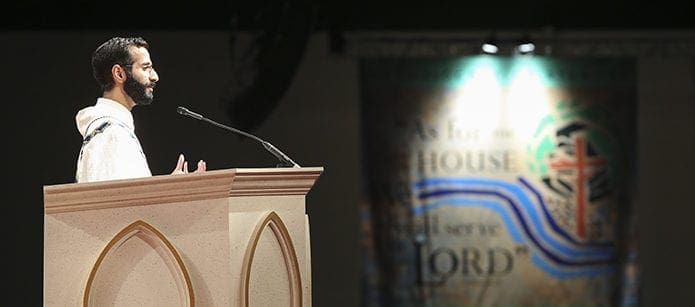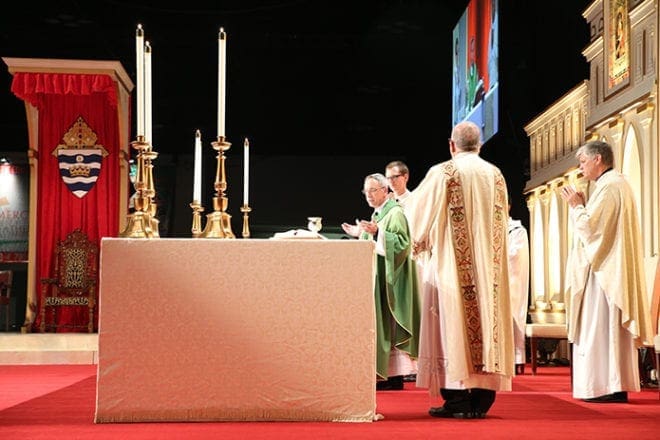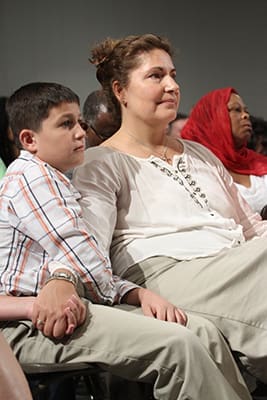 Photo By Michael Alexander
Photo By Michael AlexanderCollege Park
Opening Mass calls faithful to put Eucharist at core of lives
By SUZANNE HAUGH, Special to the Bulletin | Published June 23, 2017
COLLEGE PARK—The mystery and miracle of the Eucharist took center stage June 16 for the opening Mass of the 22nd Eucharistic Congress at the Georgia International Convention Center.
Archbishop Wilton D. Gregory welcomed all to the Friday evening Mass, the “kick-off” event, where the local church, together with fellow Catholics and neighbors from near and far, came to praise God in the Eucharist and to celebrate “being one family in Christ.”
After expressing his sincere appreciation for those gathered, Archbishop Gregory declared the congress officially open.

The main celebrant for the opening Mass, Bishop Luis R. Zarama, leads a prayer during the Liturgy of the Eucharistic. He was joined on the altar by concelebrant Bishop-designate Bernard E. “Ned” Shlesinger, far right, who was attending the Eucharistic Congress for the first time. Photo By Michael Alexander
Bishop Luis R. Zarama, auxiliary bishop of Atlanta, celebrated the Mass along with Bishop-designate Bernard “Ned” Shlesinger, homilist Father Neil Dhabliwala and priests of the archdiocese. Several deacons and seminarians were on hand for the liturgy as a congregation of about 3,000 gathered. Music was provided by the Diaconate Formation Choir, comprised of men in formation for the permanent diaconate and some of their wives.
Bishop Zarama welcomed Bishop-designate Shlesinger to his first Eucharistic Congress. Officially arriving in Atlanta only a week earlier, he will be ordained and installed as a second auxiliary bishop of the archdiocese July 19.
The day’s readings were proclaimed in English and Spanish. Father Dhabliwala, pastor of St. Catherine of Siena Church in Kennesaw, began the homily with a personal story. He confessed to receiving a speeding ticket prior to becoming a priest. He chose to appear in court and recalled that the visual similarities of the courtroom and a church caused him to accidentally genuflect before taking a seat. Habits, like genuflecting and making the sign of the cross, often become “second nature” to Catholics, but one must be watchful.
“They can slowly become mindless rituals and cause us to forget the mysteries of our faith such as the Eucharist. We forget how miraculous it is.”
Father Dhabliwala pointed to the Gospel reading from Matthew in which Jesus said that those who look at someone lustfully commit adultery in their hearts.
“Our thoughts matter,” Father Dhabliwala said, and they have “profound consequences” in our lives.
How to grow in Eucharistic devotion
He gave an example from an incident involving writer Flannery O’Connor. A profoundly Catholic person, O’Connor attended a dinner party where she encountered a university professor who had stopped practicing her Catholic faith. When the topic of the Eucharist came up and the professor referred to it as a “nice symbol.” O’Connor retorted, “Well, if it’s just a symbol, to hell with it.”
O’Connor explained later to a friend that she saw the Eucharist as the center of existence and that the rest of life is “expendable.”
“Wow!” Father Dhabliwala exclaimed. “How many of us can say that about the Eucharist?”

Kelly Todd of St. Brigid Church, Johns Creek, and her 12-year-old son H.B. were among the thousands of people on hand for the Eucharistic Congress opening Mass and healing service. Photo By Michael Alexander
He then added how easy it is when receiving the Eucharist—made possible through transubstantiation—to disregard the great mystery and miracle. Transubstantiation is the changing of the substance of the bread and wine while the outward appearance remains the same.
“What tastes like, looks like, simple bread and wine is truly the body and blood of Jesus. Jesus enters into union with us in the most intimate way. ”
Jesus becomes food for those who receive the Eucharist, Father Dhabliwala said.
“If what we believe about the Eucharist is true, then, like Flannery O’Connor, the Eucharist should be the center of our existence, the center of our lives.”
But most of us lose sight of the Eucharist’s profound reality, the priest said, and then explained why.
“We don’t really dispose ourselves to receive the fruits the Lord wants to give us in the Eucharist. We must do our part to invite the Lord in. We must be open to receive the graces the Lord wants to give us.”
He suggested praying and reflecting before Mass, receiving with reverence, staying for the entire Mass, going to the sacrament of confession frequently, attending daily Mass, if possible, and participating in Eucharistic adoration.
“If we do not take advantage of these opportunities to grow in devotion to the Eucharist, then we do ourselves a great disservice,” Father Dhabliwala said. “The Lord is calling us to a deeper personal relationship with him. If we truly can allow the Eucharist to transform us, we will bear fruit in our lives.”
Remember Christ’s love for us, he concluded. “Let it transform us. Then, we can offer our lives to the Lord as he offered his life for us.”
The humble gifts of bread and wine were brought to the altar during the Liturgy of the Eucharist. Bishop Zarama offered prayers, joined by his brother priests and the prayers of all of the faithful.
During Communion, parents with infants and young children, teenagers, business men and women, and elderly grandparents filed up to receive the Eucharist as the choir sang “How Great Is Our God.”
Following the distribution of Communion, minutes of silence and quiet contemplation passed. Even squirmy children seemed settled into the solitude of the multitude.
After the closing prayer, Bishop Zarama thanked those in attendance and invited all to the subsequent healing service, saying, “To those coming here for healing, remember that the healing already has started with the Eucharist.”
Bishop Zarama confided, touching his heart, “Jesus is in our hearts. From this place, he can perform miracles.”
Allowing Jesus to love you, to change you, is the most important healing, he explained. “Let him work freely on your heart.”